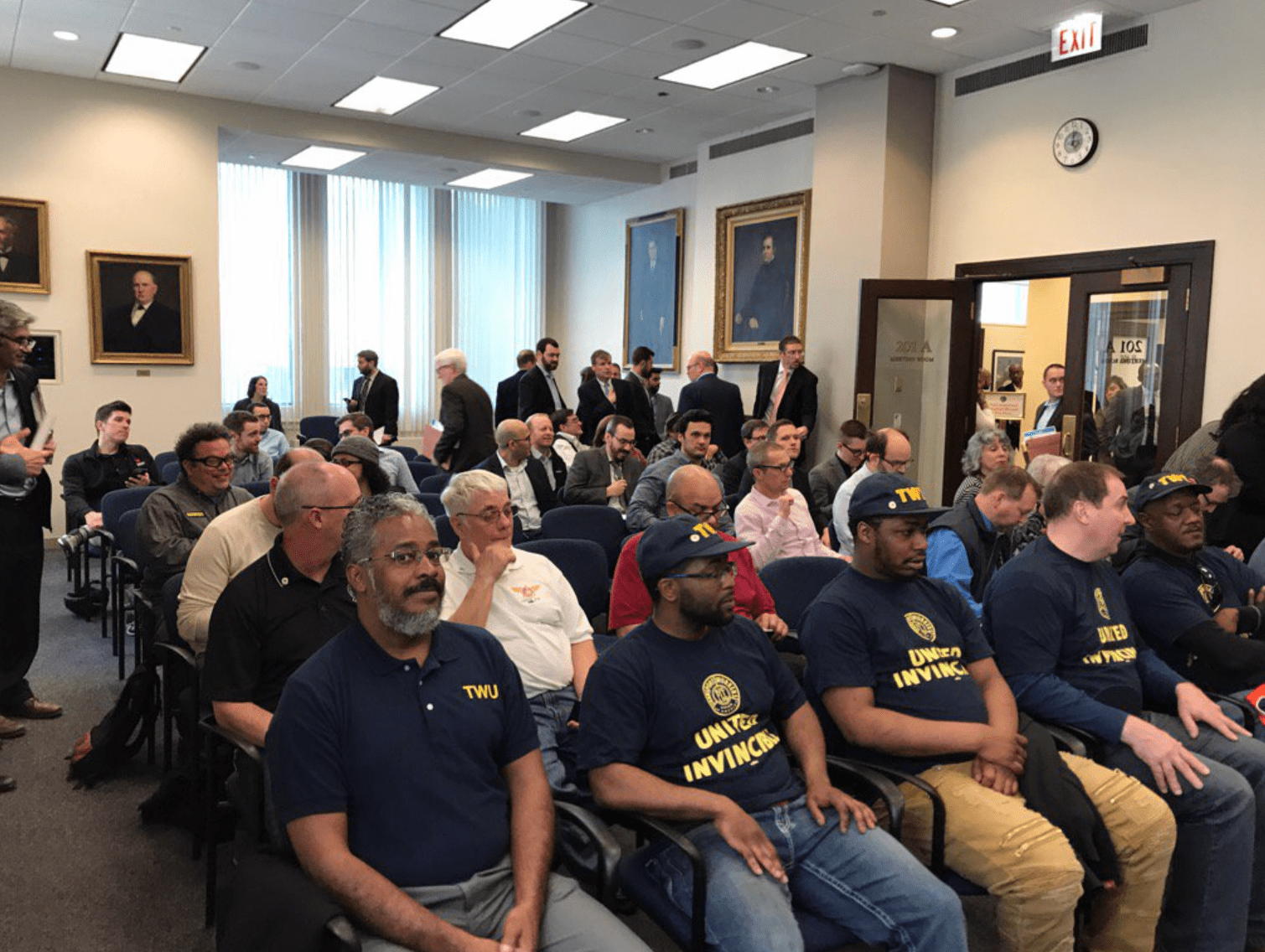Recently Uber and JUMP have shifted their propaganda machine into high gear in an effort to kill the city of Chicago's proposed contract amendment with Divvy concessionaire Lyft.
The deal would grow Chicago's publicly owned, docked bike-share system to 16,500 bikes, and expand it citywide, and have many financial perks for the city and social justice benefits for residents. The amendment would also make Lyft the Divvy sponsor, replacing Blue Cross Blue Shield of Illinois, and give the ride-hailing company the exclusive right to operate bike-share in Chicago for the remaining nine years of its Divvy contract.
Predictably, Lyft's archrival Uber, which owns JUMP, a dockless bike-share company, objects to this state of affairs. They've been doing some hardcore lobbying to kill the deal, spending plenty of cash in the process.
They're promoting the false narrative that the deal is a "no-bid contract"; in reality, the contract was bid out in 2012. They're implying that the city is missing an opportunity to get $450 million in investments from Uber with no exclusivity–in truth Uber would spend only $200 million unless it was given a monopoly. And they're protesting that the Lyft deal is unfair to the South and West Sides because Uber would provide bike sooner, deploying 20,000 cycles by this summer. The fact is, Uber currently only has a few thousand bikes spread across the entire country, so that's an absurd timeline.
So far Uber and JUMP's public relations blitz has included:
- The misinformation-filled PumpTheBrakesChicago.com website
- Thousands of dollars spent on Facebook ads within a few weeks
- Purchasing flattering coverage on a local news and culture website
- Buying a full page ad (read it here) in the Chicago Sun-Times with endorsements from 43 South Side faith leaders, including civil rights leader Reverend Jesse Jackson Sr.
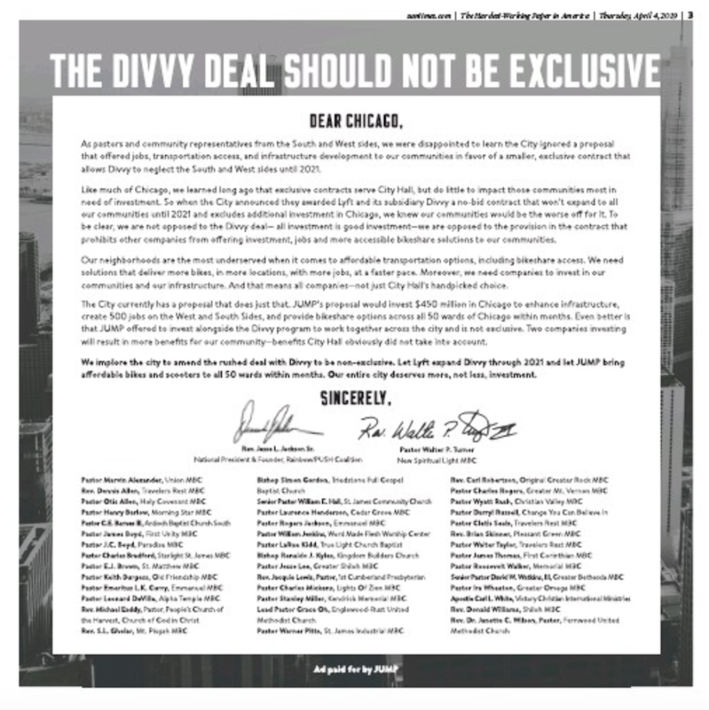
It's also unclear why so many members of the clergy have taken a sudden interest in bike-share. A spokesperson for Jackson didn't respond to a request for comment, and Uber and JUMP have not responded to multiple inquiries about the Lyft/Divvy deal.
However, all that money spent on propaganda didn't seem to do Uber much good at today's Committee on Pedestrian and Traffic Safety meeting at City Hall. After extensive testimony by city officials and Lyft personnel, as well as advocates for and opponents of the Divvy expansion deal, the aldermen on the committee voted unanimously to approve it.
The contract amendment goes before the full City Council for a final vote on Wednesday. Typically legislation that has been approved in committees gets rubber-stamped by the Council, but there's many a slip between cup and lip, and who knows what other kinds of questionable PR strategies Uber will pull over the next two days.
During the hearing, Chicago Department of Transportation Commissioner Rebekah Scheinfeld detailed the benefits of the Lyft/Divvy deal for the committee members, in a room packed with attendees. She noted that reps for 26 community groups, academic institutions, and disability rights advocates have written letters of support for the contract amendment. The deal includes the creation of 200 jobs; job training programs for youth and ex-offenders; the expansion of the Divvy for Everyone (D4E) equity program; and the creation of an adaptive bike-share service for people with disabilities.
Scheinfeld noted that financial perks of the deal include the expansion and electrification of the system at no cost to the city; a guarantee of $77 million for the city in sponsorship and ad revenue over nine years; and a cut of any operations profits or ad revenue over $20 million. In addition, Chicago would be relieved of the burdens of paying for its share of any operations losses (currently about a $1 million annual liability for the city), and funding D4E, which costs about $350,000 a year.
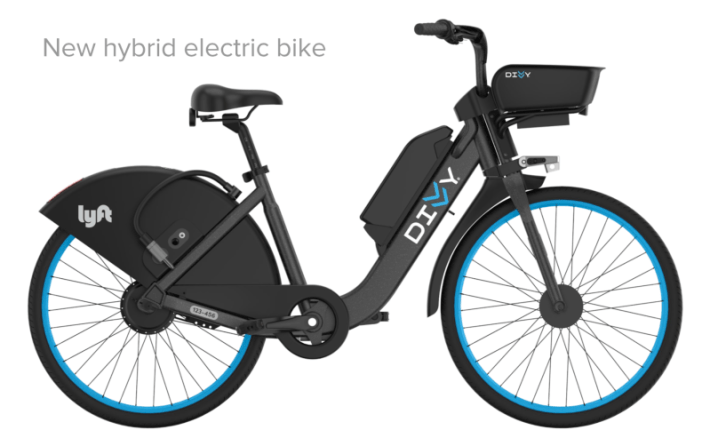
Scheinfeld also stressed that the Lyft deal, as opposed to Uber's proposal, would keep bike-share in public control. "The system will remain accountable to the city." She argued that this will make it easier to ensure that the bikes are deployed in an equitable and orderly manner. Station placement "is something that we have done with extensive outreach to you and your colleagues," she told the aldermen. Furthermore, she said, maintaining a publicly-owned system eliminates the risk of the operator of a privately-owned bikes pulling up stakes if its business model proves unprofitable.
6th Ward alderman Roderick Sawyer said he generally supported the contract amendment but had concerns about the exclusivity clause. Scheinfeld responded that when Divvy launched, "it was with the understanding that this would be the city's bike-share system. We took a bet on this... and with the sweat equity of Chicagoans we have built this into a gold-standard system." She added that without giving Lyft a monopoly, there would have been no incentive for the company to pay for all the new hardware (necessary because the federal transportation funds used to launch Divvy have dried up under Trump), or negotiate the financial and equity benefits of the deal.
28th Ward alderman Jason Ervin wondered if there might be any unintended consequences of the deal if it turns out that the city has underestimated the value of the franchise, or if technology changes in the coming years. Scheinfeld assured him that the city is getting a great deal compared to similar arrangements in other cities. "We are above-market here." Ervin asked if there would be any cost if the city terminated the contract. Scheinfeld said there would be, but it wouldn't be in the interest of the city to do that anyway, because it would have to refund some of the federal grant money used to purchase the current Divvy hardware.
18th Ward alderman Derrick Curtis asked when his district would be getting Divvy. "I have a beautiful bike path in the Dan Ryan Woods, but no bikes." Lyft representative Caroline Samponaro told him that the plan was to install stations in his ward, and other parts of the Far South Side, this summer.
4th Ward alderman Sophia King questioned why the city is only requiring Lyft to spend 5 percent of its contract on POC- and women-owned Disadvantaged Business Enterprise subcontractors. Samponaro responded that Divvy spends most of its budget on equipment, which would be difficult to procure from local firms, and it has committed to employing a union workforce, which means that expenditure is removed from the DBE "bucket." King and Committee chair 27th Ward alderman Walter Burnett said the situation needs to improve, and Scheinfeld suggested that Lyft provide regular updates on its efforts to work with more DBE firms.
During the public comment period, representatives of the Illinois Hispanic Chamber of Commerce, City Colleges of Chicago, DePaul's Chaddick Institute, and the Active Transportation Alliance provided brief endorsements of the deal.
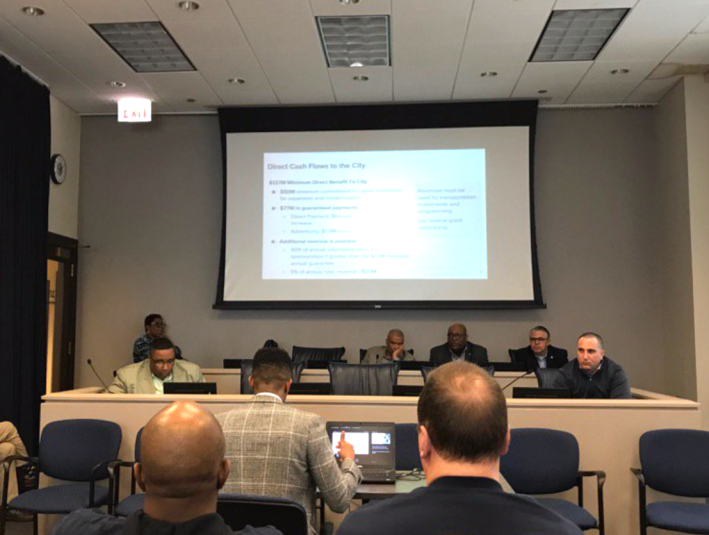
However, community advocate Tim Brown, who recently organized a City Hall press conference against the contract amendment featuring South and West Side community leaders, told the aldermen, "I'm in favor of the largest, most equitable agreement to be spread over Black and Brown neighborhoods," referring to Uber's pitch. "I'm asking that we throw everything in the pot." Brown has said he is not being paid by Uber to speak out against the Lyft deal.
In response, Ervin questioned whether letting Uber and JUMP compete in Chicago would actually result in better service for communities of color. He noted that private companies "want to go where the money is," i.e. more affluent neighborhoods.
Angelo Cucuzza from Transport Workers of America, which represents Divvy employees, said the deal would result in more union jobs with good benefits, whereas JUMP doesn't use union labor. As a New Yorker, he added that the NYC model, where docked bike-share is used in the central city and dockless companies are allowed to operate in outlying neighborhoods, shows why it would be a bad idea for Chicago to split bike-share turf with Uber. He called the dockless bike-share situation in Staten Island and the Rockaways "absolute chaos."
Alex Wilson and Anthony Cruz from the West Town Bikes education center, which has run youth jobs-training programs for Chicago, testified that expanding the program under the deal would be great for community development. Wilson noted that some West Town program participants, including Cruz, were high-school drop-outs who went on to get their GEDs and living-wage jobs at Divvy. "Now, instead of being a burden on society, they're giving back to their community." Cruz is currently the manager of West Town's retail store, Ciclo Urbano.
Jeremy Glover from the Metropolitan Planning Council said it's wise for Chicago to keep bike-share in public hands. He noted that last year St. Paul chose the dockless firm Lime as its bike-share provider over Nice Ride, which had operated a docked system there for years. However, it was recently announced that Lime is pulling its bikes out of the city after a mere eight months, leaving it with no bike-share system this summer. In February, Lime pulled its fleet from Rockford, Illinois, after less than a year, leaving that city without bike-share as well.
Notably no Uber or JUMP representatives testified at the hearing.
After the unanimous vote to move the legislation to the full Council, Lyft spokesperson Julie Wood told me that, unlike its competitor, her company hasn't bought any advertising to promote their position, although they did reach out to community organizations to ask for their endorsements. "We haven't felt the need to buy any advertising," she said. "The support is pretty strong because we have a well-known system and [Motivate, the company that Lyft purchased last summer has] spent many years making connections in the community. If you're seeing the list of who's supporting the deal, you'll see lots of groups who have knowledge of Divvy and have interacted with it for a long time."
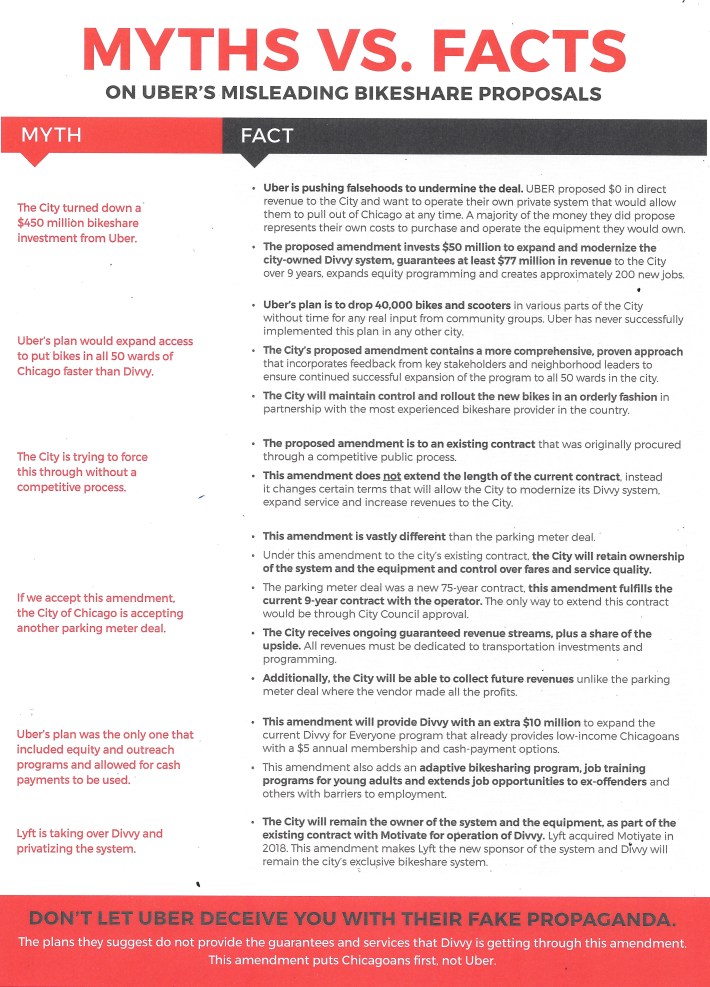
So does Wood believe Uber has been honest in the way it has been portraying the Divvy/Lyft expansion deal? "No," she replied. "They put forward a bunch of things that were not accurate about both our proposal, and their quote-unquote proposal, but no one has the ability to see [Uber's proposal.] We are in a contract with the city so we are being held to very high standards. These numbers are real and have the force of law behind them, and I'm not sure where their numbers are coming from."
Here's an updated list of community organizations and reps that have endorsed the Divvy/Lyft contract amendment.
- Garfield Park Community Council, Mike Tomas
- Quad Cities Development Corporation, Rhonda McFarland
- Active Transportation Alliance, Ron Burke
- Illinois Hispanic Chamber of Commerce, Jaime di Paulo
- Chaddick Institute, DePaul University, Joseph P. Schwieterman
- Urban Transportation Center, UIC College of Urban Planning and Public Affairs, Dr. P.S. Sriraj
- Chicago State University, Zaldwaynaka Scott
- Regional Transportation Authority, Leanne Redden
- Chicago Metropolitan Agency for Planning, Joe Szabo
- Metropolitan Planning Council, MarySue Barrett
- Safer Foundation, Victor Dickson
- Blackstone Bikes/Experimental Station, Connie Spreen
- West Town Bikes, Alex Wilson
- Chicago Cook Workforce Partnership, Karin Norington-Reaves
- Beverly Area Planning Association, Susan Flood
- Shared-Use Mobility Center, Sharon Feigon
- Shirley Ryan AbilityLab, Derek Daniels
- UCAN, Daisy Lynn Mertzel,
- Ron Singer, South Loop resident
- North Lawndale Employment Network, Ana Encarnacion
- Dare2tri, Keri Serota
- Eugene Field Park Advisory Council, Amy Kellogg
- Access Living, Marca Bristo
- The Chicago Lighthouse, Janet Szlyk
- Equip for Equality, Barry Taylor
- South Shore Chamber of Commerce, Tonya Trice
